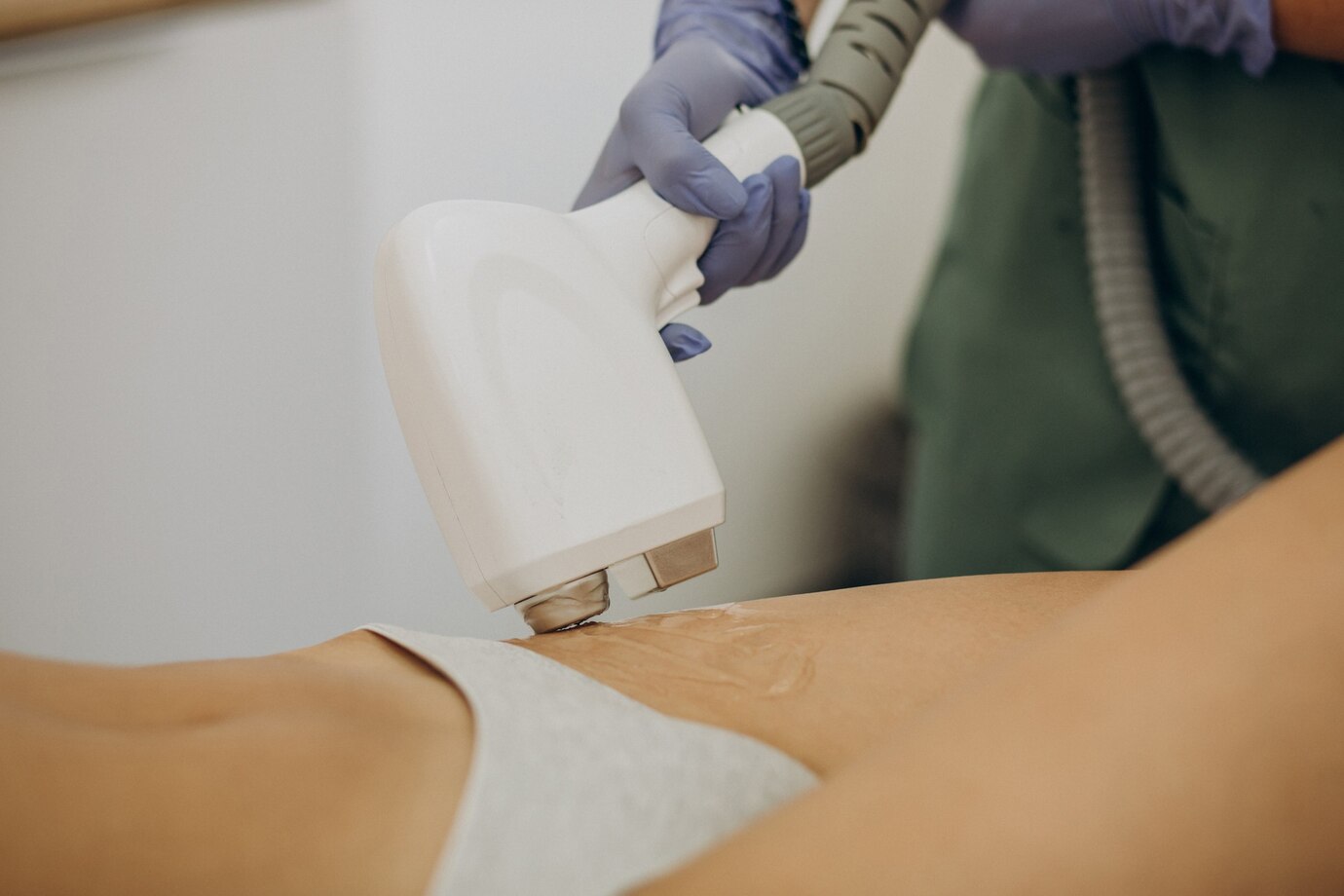
Depending on several criteria, you may or may not be the best candidate for laser hair removal. To comprehend these variables, it is critical to understand the principles underlying laser hair targeting. The melanin in the hair follicles is the target of the laser light. The laser can destroy hair follicles without harming the skin since it is equipped to focus on melanin.
Nevertheless, for a successful treatment, certain critical factors must be considered that makes you one a good candidate for hair removal with laser. Hence, continue reading for a list of characteristics to know who is a good candidate for LHR.
-
If you are over the age of eighteen
-
If you have dark hair
-
If you have dark hair and light skin. Regardless, even if you have very pigmented skin, you can still opt for the procedure..
-
If you are not sunburnt or tanned recently
-
If you are not pregnant and do not plan to become pregnant
Understanding Hair and Skin Types for Best Laser Hair Removal
Dark, coarse hair type is the best kind for laser hair reduction. On the other hand, some lighter hair types can benefit from laser hair removal thanks to technological advancements. Those with pale complexion and dark hair are the most suitable candidates for this reduction.
The effects of laser hair removal may be more difficult to notice for people whose skin darkens quickly. The hair must be sufficiently dark to allow the laser's beam to focus on the pigment. Naturally, white, redheads, pure blondes, and gray-haired people are unlikely to benefit from laser hair removal if their hair follicles do not contain pigment.
Regarding laser hair removal, persons with darker skin tones, Black or Asian complexion, or those concerned about discoloration, scarring, or additional skin damage were advised against using the technology. In the past, laser hair removal performed best on people with lighter complexions and dark hair.
Thankfully, hair removal has become a safe choice for people of all skin tones, thanks to advancements in laser technology. Modern hair removal lasers have become more advanced, with parameters that can be changed based on the skin’s tone and the natural color combinations of the hair. This covers the density and thickness of hair.
Assessing Your Health History and Conditions
It is generally beneficial to be in good health when starting laser hair treatment procedures. It is essential to inform doctors about any medications, or previous treatments that might affect your care. The following conditions could prevent laser hair removal from working:
-
melanoma's past
A history of melanoma suggests that a certain type of skin cancer has previously occurred or been treated
-
elevated moles
Moles that stand out or are elevated above the skin
-
unsettling lesions
unsightly or concerning sores or deformities on the skin
-
keloid scar development
the tendency for scars to develop larger and broader following surgery or trauma
-
solving issues with healing
obstacles or difficulties related to the normal healing process following an injury or wound
-
ongoing infections
constant or ongoing infection presence
-
hives and open lesions
open cuts or sores and elevated, itchy blisters on the skin
-
herpes simplex lesions
the herpes simplex virus causes blisters on the skin that are frequently connected to cold sores
-
chilly sores
term used to describe cold sores, which are usually brought on by the herpes simplex virus
-
Permanent cosmetics or tattoos in the treated area
existence of tattoos or permanent cosmetics in the area under consideration for a certain therapy
-
usage of St. John's wort, tetracycline, or Accutane within the previous year
recent use of particular drugs that could affect or rule out certain treatments
-
autoimmune conditions such as Vitiligo, Scleroderma, Lupus,
existence of autoimmune diseases influencing the feel or color of the skin
-
trying to conceive, or nursing
current state of trying to conceive or breastfeed, which could affect how certain medical choices or treatments are made
Temporary Hair Removal and It’s Reactions
Although temporary hair removal techniques like shaving and waxing provide instant cleanliness and convenience, they are not without side effects.One major negative is the quick regrowth, which may be tiresome and requires frequent care.
Regrown hair can show very quickly, which might result in an endless cycle of plucking or shaving. Furthermore, soreness, redness, or irritation are possible side effects for people with sensitive skin, particularly after waxing.
The usual complaints of ingrown hairs and skin pain make these procedures less tempting if you want a more cautious approach to hair removal. Furthermore, many people may experience financial challenges because to the ongoing costs of razors, shaving cream, or professional waxing appointments.
Learn the Importance of Sun Exposure
Even though it is considered safe, it is advised to avoid direct sun exposure for a minimum of two weeks before therapy because it increases skin sensitivity to heat. Utilizing a laser on heat-sensitive and tanned skin can result in burns, damage, and discoloration.
The general rule is to use at least a factor of 40 sunscreen if you want to be outside in the sun. A factor of 50 should be applied to your skin for optimal results. Your skin will not be vulnerable to harm or the possible hazards of using lasers on tanned skin.
Assessing Your Hair Color and Treatment Areas
Your hair color affects how successful a particular treatment is as well. The therapy will work better on darker hair because it will be simpler for the beam to target individual hair follicles. The efficacy also varies depending on the kind of laser that your healthcare expert utilizes.
Specific lasers employ distinct wavelengths to target lighter hair colors more effectively; some are more powerful and precise than others. All of the following can be a treatment area:
-
Toes
-
Legs
-
Bikini Area (internal buttocks + Brazilian + expanded bikini line)
-
Fingers and Hands
-
Underarms
-
Abdomen Line
-
Shoulders and Neck
-
Nose
-
Cheeks
-
Jaw Chin
-
Upper Lip
-
Knees
-
Rear End
-
Arms
-
Chest in Back
-
Ears
-
Sideburns
-
Eyebrows
-
Jaw
-
Face
-
Chin
How to Choose the Right Type of Laser
Selecting the best type of laser hair removal requires considering several variables to guarantee efficient and secure outcomes. Regarding laser hair removal, diode, alexandrite, and Nd:YAG lasers are the most often employed varieties.
Every kind has unique qualities and works well with various skin tones and hair shades. While alexandrite lasers are suitable for people with lighter complexions and finer hair, diode lasers are frequently better for more delicate skin colors and darker hair and removes hair better.
All skin types, even those with darker skin tones, can benefit from Nd:YAG lasers. It is critical to evaluate your complexion and hair color in addition to seeking advice from a licensed dermatologist or laser professional who can identify the best laser for your particular requirements.
Furthermore, considering elements like the practitioner’s experience, the clinic’s image, and the safety protocols can help ensure a pleasant and effective laser hair removal procedure.
Conclusion: Evaluating Your Candidacy
Permanent hair removal can be accomplished safely and effectively with laser hair removal. To summarize, the following four indicators indicate that you would benefit from laser hair removal:
-
You have unwelcome, thick body hair.
-
You have fair skin and brown hair.
-
Your timetable could be more relaxed.
-
Your medical record is transparent, and your skin looks good.
You should discuss your objectives with your specialist to have the most outstanding results. Some individuals would want less hair on their bodies, while others would wish to remove all of their undesirable hair.
Those who stick with a treatment plan until they achieve their desired outcomes are frequently the happiest.
FAQs
-
Which types of hair react to laser hair treatment the best?
Dark, coarse hair is Ideal for hair removal laser treatments. Since the laser light looks for the black pigment in the hair strand and cannot perceive lighter hairs, it takes longer to react to red, white, and blond hair.
2. How to prepare your client for laser hair removal?
-
Steer clear of sunbeds and all tanning.
-
Refrain from plucking or waxing the regions
-
Scrub the area used for therapy.
-
Polish the region under treatment.
-
Steer clear of skincare irritants
-
Avoid bleaching the intended region
-
Shave the day before the appointment.
-
Dress comfortably and loosely.
3. Under which health conditions should clients avoid laser hair removal?
-
Generally speaking, laser hair removal should not be done during nursing.
-
People with the following ailments are not a good candidate for laser hair removal
-
psoriasis
-
bleeding issues
-
severe histamine-related reactions
-
Previous procedures, including laser resurfacing as well as chemical peels
-
vitiligo
-
Several drugs have adverse effects, some of which include increased photosensitivity of the skin.
-
Melanin, produced by your skin to shield it from injury, will increase in response to the sun. There are better ways to begin laser hair removal, as this might make your skin tone uneven and spotty.
-
Injuries that do not heal completely can leave behind keloid scars, which can be particularly dangerous for people undergoing laser hair removal.
-
Tattooed regions of the skin should not be exposed to laser treatments.
-
Harrowing places of the body may be those with open wounds or lesions after laser hair removal.
-
Patients with light-induced epilepsy are usually cautioned against undergoing laser hair removal until they obtain a note from their doctor authorizing the surgery.
4. Who is not suitable for laser hair removal?
-
If you are pregnant, you might need to forego the operation.
-
Are using specific drugs, including acne remedies.
-
Possess HSV-2 genital herpes or are vulnerable to cold sores.
-
Possess elevated keloid scars.
-
Possess skin cancer and have had it.
5. Which skin type responds best to laser treatment?
Types of Lighter Skin on the Fitzpatrick Scale(I–III): Lighter skin types are generally more suitable for laser hair removal since they have less skin pigment.


